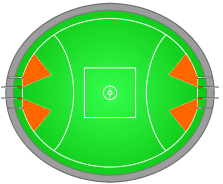glossary of terms
Australian Football has developed a unique and rich terminology.
This list is an alphabetical glossary of terms, jargon and slang.
P
- pack
- a mass of players from both sides all attempting to get the ball at the same time
- Can be used for players flying for a mark or scrambling for the ball at ground level.
- paddock
- an australian rules football oval
- Pagan's paddock
- an attacking tactic
- It involves clearing all attacking players from the attacking fifty-metres, and kicking the ball into the resulting open space.This gives key forwards room to run into, often running with the flight of the ball toward goal. It was developed by Dennis Pagan in order to fully utilise key forward Wayne Carey in the 1990s.
- percentage
- the ratio of points scored for versus points scored against
- Percentages are used as a tiebreaker for ladder positions if teams are on equal premiership points. The AFL uses the formula:
FOR ÷ AGAINST × 100
meaning that percentages may exceed 100%. The SANFL uses the formula:
FOR ÷ (FOR ᕀ AGAINST) × 100 - pill
- colloquialism for the football
- ping
- to attempt a shot at goal
- pinged
- a player who is penalised by an umpire for breaking a rule
- playmaker
- a player who directs a team play by action or deed during a game
- play on!
- the verbal and visual instruction given by a field umpire
- To indicate that:
(a) a free kick or mark will not be awarded and play will continue; or
(b) a player has attempted to dispose of the football other than in a direct lineover the mark and the football is therefore in play. - an indicative part of the ground
- The area proscribed by an imaginary line running from the goal post to a point on the boundary line before the fifty-metre arc.
 There are two pockets at each end of the ground, referred to as the left and right, forward and back pockets, e.g.>left-forward pocket.
There are two pockets at each end of the ground, referred to as the left and right, forward and back pockets, e.g.>left-forward pocket. - point
- the basic scoring unit
- Used for both the total score (10 goals, 8 behinds, 68 points) and can be used interchangeably with behind.The player's shot for goal missed and was only a point
- possession
- when a player grabs the ball with a reasonable amount of time to dispose of it
- Includes ground ball-gets, marks, handball receives, effective contested knock-ons and frees for.
- poster
- a kicked ball which hits a goal post
- Resulting in a behind being scored rather than a goal.
- premiership
- awarded to the winner of the grand final
- premiership quarter
- colloquialism for the third quarter of a match
- premiership window
- the range of years that a team has a likely and realistic chance of winning the premiership
- prior opportunity
- rule of the game
- A player who has had the ball for long enough to make a reasonable attempt to dispose of it before being tackled is said to have had prior opportunity or simply prior.This is important for holding the ball decisions, where a player who has had prior must dispose of the ball immediately, while a player who has had no prior has a few extra seconds to dispose of the ball.
- protected zone
- an imaginary corridor ten metres to either side of a player who is taking a free kick

No players from either team are permitted to be in this area.- punt
- a type of kick
- Abbreviated form of drop‑kick & punt.
- push in the back
- an illegal tackle or interference
- The rule is applied in two different circumstances: tackles and marking contests.
The umpire signals a push in the back by holding both hands open, palms facing outwards, in front of his chest, then making a pushing motion outwards with them. However, his action often reflects the push which is being penalised so a push in a marking contest will see the umpire push his hands outwards, while driving a player into the ground will see the arms pushed further downwards.
Australian Football has developed a unique and rich terminology.
This list is an alphabetical glossary of terms, jargon and slang.





















